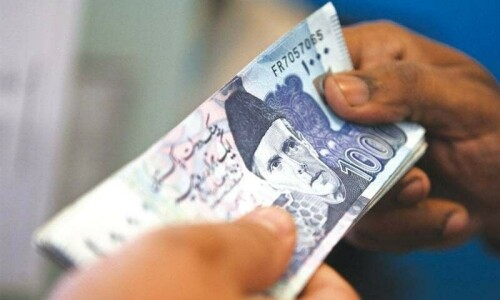KARACHI, March 1: The Privatisation Commission (PC) has not come out with its annual report for 2006-07 after expiry of nine months. “We are compiling data for the annual report and balance sheet of the fiscal year,” a senior PC official informed Dawn on Saturday from Islamabad.
He was however not in a position to disclose as to when this exercise will be completed.
The PC website shows 2005-06 annual report and informs about 33 expected transactions in 2007. The move for divesting PIA’s Roosevelt Hotel in New York and some other entities had invoked anger from PPP Senator Enwer Beg who questioned the credentials of the caretaker government to take up such a job.
Only sketchy information is available on the website about 2006-07 and the PC is reported to have completed seven transactions amounting to Rs104.31 billion. These include Global Depository Receipts (GDRs) of OGDCL and UBL and divestment of SPO, Pak American Fertiliser, Javedan Cement Limited, Lyallpur Chemicals and Fertilisers and Lasbela Textile Mills.
During July to December 2007, some 3.26 per cent of UBL shares were sold through GDR for Rs5.15 billion and 7.5 per cent of HBL shares through IPO for Rs12.16 billion.
For the current fiscal year, a target of Rs114 billion in privatisation proceeds has been set against which only Rs27 billion is reported to have been realised.
Except for reviewing the ongoing transactions and completing a few incomplete formalities, the PC is not finding any job to do. “We are waiting for our new elected political masters to give us guidelines and new framework for privatisation if they deem it necessary,” a PC official said.
“The annual report for 2006-07 would have given the Privatisation Commission an opportunity to put on record its version on the controversial deal of Pakistan Steel which was set aside by Supreme Court,” said a market analyst.
He recalled that President Pervez Musharraf criticised the Supreme Court judgement and held it responsible for discouraging foreign investors from coming into Pakistan.
Much before the Supreme Court could come out with a detailed judgement on scrapping the privatisation deal, the Council of Common Interests then constituted hastily under the chairmanship of prime minister Shaukat Aziz to conform to the provisions of 1973 Constitution brought Pakistan Steel again on the agenda of PC.
“The PC helped Musharraf-Shaukat Aziz duo to use proceeds for bridging budget deficit,” the market analyst explained. Under Privatisation Ordinance 2000, 90 per cent of privatisation proceeds are to be used for clearing government debts and 10 per cent on poverty alleviation programmes. Debt servicing and poverty alleviation are big budgetary expenditures every year, for which privatisation proceeds were used in last five and six years.
“Neither the amount of foreign and domestic debt has been reduced nor poverty conditions improved after eight years rule of Musharraf and Shaukat in the country,” a political activist observed who is worried on the challenges of the future elected government.
During 2005-06, the PC reported realisation of Rs175.78 billion as against Rs43 billion in 2003-04. From 1991 when privatisation formally commenced with much controversial divestment of 26 per cent shares of Muslim Commercial Bank, the total proceeds amounted to over Rs475 billion. The bulk of this amount had been used by the government to meet mounting deficit of the budget.
In 2006, the PC had set for itself a very ambitious programme to disinvest about two dozen public sector entities before national elections that were then due in late 2007. After elections, there was a long list of 63 units brought under the hammer of privatisation. Had this been done, virtually all segments of the economy -- finance and capital, oil and gas, energy and power sector, communications, railways and ports, airports and allied services and shipping were to be passed on to the private sector.
“How will Pakistan’s political, social and economic landscape look like, if all these segments are taken out of government controls?” This question, according to market analysts, perhaps never bothered the military and quasi-military government leaders.
Leaders of the previous government never visualised a corresponding political structure, a responsive bureaucratic administration and an independent judiciary with a vibrant media for a society where government control is minimum but regulations on business are tough and uncompromising and effective security nets and opportunities are set in place for the disadvantaged classes.
Instead, the government went for devolution which further consolidated the administrative and bureaucratic centralisation and created more provincial disharmony and friction. Liberalisation and privatisation generated cartelisation putting consumers under tremendous pressures.
“The new elected political leaders will have to find a time out to give a hard look at the privatisation policies and objectives and set new priorities for them in the future,” market analysts say. Perhaps, the budget for 2008-09 may incorporate the strategies and objectives that new leaders plan to set for themselves.














































Dear visitor, the comments section is undergoing an overhaul and will return soon.